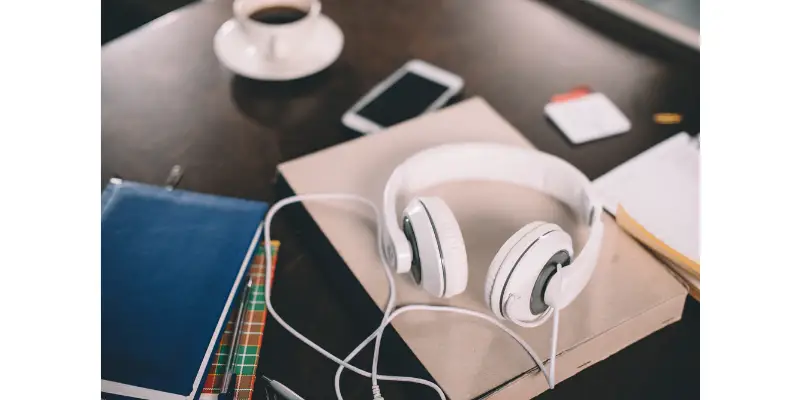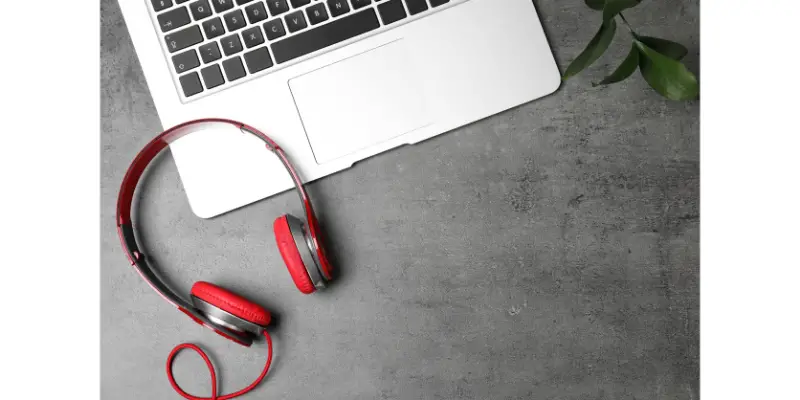Disclaimer: This post may contain affiliate links, meaning we get a small commission if you make a purchase through our links, at no cost to you. For more information, please visit our Disclaimer Page.
Headphones come in many shapes and sizes. They can be wired or wireless, have a cord or not, and come with different controls.
Headphones will drain battery power as it needs electricity to function. Normally, the amount is negligible. Top-quality headphones with a higher bass-setting will drain the battery slightly more. Similarly, wireless headphones and earbuds consume more power than their wired counterparts.
Table of Contents
Do Wired Headphones Drain Battery?
Headphones are electrical devices. And like any other electrical device, it needs to run on electricity. Wired headphones acquire this power from the device they are connected to, which are typically laptops, desktops, smartphones, PlayStation, etc.
When you insert a headphone’s plug (the pointed end) into the audio jack of a device, you are essentially creating a closed circuit. Now, electricity can run through this circuit, pass through the wires inside the headphones and reach the actual earpieces. This results in you being able to hear the sound from the device.
Since wired headsets get power directly from another device, they do not need a separate power source. In the case of smartphones and laptops, the power is coming from their batteries. So, using headphones will drain the battery life of a smartphone or laptop. But how much power do they truly consume?
How Much Power Do Wired Headphones Use?
In most cases, the number of power headphones takes up is very negligible. Of course, the exact amount will depend on multiple factors.
The primary determining element is the impedance level of a headphone. This is the resistance that the electricity or current faces when passing through the wires of a headphone.
The impedance rating comes with every headphone so that you know exactly how much power it needs. A device with a high impedance rating will require more power to operate and therefore, drain batteries faster. Conversely, a device with low impedance will need little power to run.
Typically, the lower quality headphones that come as complimentary with most phones have low impedance. Meaning they will take up less power as well.
But if you want a superior audio experience, you will want a top-quality pair of headphones. Professional headphones that sound designers or audiophiles utilize fall in this category. These devices obviously need more power to produce higher quality. As such, they will drain your phone or laptop battery that much quicker.
But even then, the power requirement is not that vast. And most modern laptops and smartphones have a capacity that far exceeds it. Ultimately, the power that these headphones will consume accounts for a tiny fraction of the total usage you rack up over a day.
Do Wireless Headphones Drain Battery?
On their own, wireless headphones or earbuds will drain absolutely no power. But using them to play music or video on your device will. This is because wireless headphones operate differently than their wired versions.
Wireless headphones typically utilize a Bluetooth connection or some built-in networking system to run. So, you do not directly connect the headphone to your smartphone or laptop. As such, they will not normally drain any power since there is no circuit to supply the electricity.
But wireless headphones still need the power to function. They receive this power from built-in batteries that need to be charged periodically. For earbuds, the charger is integrated into the case that comes with it. Bluetooth headphones need to be charged the same way you recharge your phone.
But using wireless headphones or earbuds is another matter. As we mentioned, these devices operate via Bluetooth or some other network on your phone or PC. You need the power to maintain this network consistently. And this power comes directly from the device that is also playing the audio.
The combination of maintaining the network and streaming music will drain a noticeable level of power from your device’s battery. Especially because your phone will use classic Bluetooth settings over BLE in order to stream the music. And classic Bluetooth takes double the power than BLE (Bluetooth Low Energy).
This is how wireless headphones and earbuds can contribute to draining your battery life.
Do Wired Headphones Use More Power Than Earbuds?
Knowing the difference in power consumption between each type of audio device is important. Because you do not want your phone or laptop’s battery to enter the red zone while using headphones, especially if you are completing an important task at the same time. Depending on how much power you have, you may need to switch up your gear.
Typically, wireless headphones will consume greater power than wired ones. The same goes for earbuds. This may seem contradictory as wired headphones directly drain power from the source. So, why does a small piece of air Pod contribute to a shorter battery span?
Well, the actual headphones themselves need very little power to officiate. With earbuds and Bluetooth headphones, they have their own batteries. But the power that wired headphones will draw is almost a non-factor.
The main point of difference comes in how the two-stream the music. As the name gives it away, wired headphones use physical wires to transfer the audio. Earbuds use wireless networking (mostly Bluetooth) to do the same.
Now, when your android device is actively streaming audio through a wireless network, it has to operate various modules at the same time. This, in turn, drains more power from the device’s battery. This consumption of power is separate from the power need to activate the earbuds.
Of course, the level of volume also plays a role here. When you use a headphone, chances are the volume level will be higher than if you were using earbuds to listen to music. This is because streaming music through earbuds at a high volume can easily damage your ear.
But the power difference here is pretty small. It is when the device actively has to play music over a wireless network does it lead to more power consumption.
So, your phone’s battery level can often dictate which type of headphones you should use. If the phone is low on energy, it is better to turn off the Bluetooth and use wired headphones instead.
Why Does My Headphones Drain Battery So Fast?
Normally, it is not the actual headphones that rapidly drain your phone’s battery, rather it is the apps you are using that are often the culprit. Very rarely will headphones be the reason that you run out of power at a crucial moment.
Some apps consume significantly more power to run such as social media apps, especially if you are using them for voice or video calls. If you are running another app while music plays in the background, it will drain the power even quicker.
Now, wireless headphones drain more energy due to their reliance on a Bluetooth network. And sometimes, the power drainage can be significant. But once again, the amount of power consumed will largely depend on the type of activity you are performing.
For example, Apple’s AirPods can give you 5 hours of music time on a single charge. This number comes down to 3 hours if you use it to talk over voice calls or video chats. Meaning the specific activity plays a huge role in power consumption.
And the same goes for the battery inside your phone or laptop. Playing a video will drain the battery faster than just listening to music. Talking to someone on WhatsApp will consume more power than a simple voice call.
So, if your phone’s battery is running out very fast, it is most likely not the fault of the headphone. Rather you should use apps that are devouring a lot of power.
Also, simply leaving the headphones connected will drain little to no power, even when using Bluetooth. You have to actively stream audio for there to be power consumption.
Conclusion
Headphones, both wireless and wired, play a big role in many people’s lives nowadays. So, knowing how they work and how to use them properly goes a long way to make them long-lasting.


